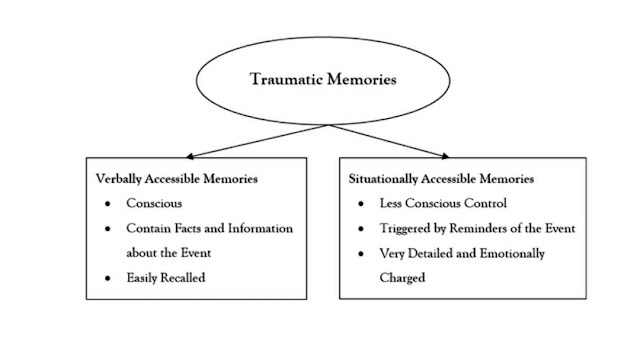Understanding PTSD
This post is based on the book Overcoming Trauma and PTSD: A Workbook Integrating Skills from ACT, DBT and CBT by Sheela Raja and Susan M. Orsillo. Images are from the same book.
Post Traumatic Stress Disorder (PTSD) is a common reaction to experiencing something traumatic. Reactions to traumatic events usually involves intense fear, helplessness or horror. In addition, after the trauma, you experience one or more of these other types of symptoms:
- Re-experiencing
Bad dreams
Distressing memories Feeling that the trauma is happening over and over again. - Avoidance
Going to great lengths to avoid any reminders.
Avoid certain places or people that remind you of the incident.
Unable to remember important aspects of the traumatic event.
Lack interest in life - disconnecting from people
Emotionally numb - Feeling constantly anxious or on edge
Difficulty sleeping and concentrating
Difficulty managing anger
Feeling irritable
Being "on guard", always scanning your environment for possible threats
Easily startled or reactive to noises or unexpected changes in your environment.
Trauma changes your pre-existing beliefs about the world and yourself. Trauma memories are highly emotionally charged and go against our beliefs about how the world works.
E.g.: of those beliefs include:
- The world is a safe place
- Life is predictable
- Horrible things don't happen to good people
- Really bad things happen to other people, not me.
Replaying a trauma memory may occur because you are trying to understand how it could have happened to you - trying to fit it into your belief system.* When you're unable to understand it, it can cause anxiety, depression, shame and guilt.** They may also be stored in a different part of the brain and coded differently from regular memories.***
Only 8% men and 25% women who are exposed to traumatic events develop full blown PTSD.****
And the truly good news is, people are incredibly resilient and have the ability to heal from even the most difficult of trauma, if they have the right tools, support and circumstances.
* Cahill and Foa, 2007
** Janoff-Bulman, 2002
*** LeDoux, 1992
**** Kimerling, Ouimette and Wolfe, 2002




Comments
Post a Comment
Leave an opinion!